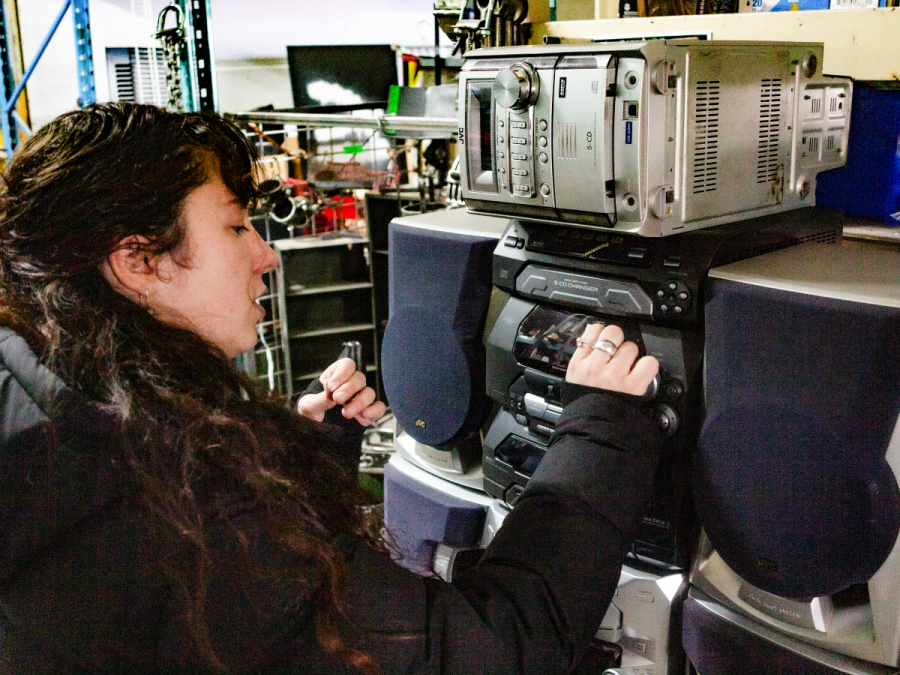Reduce, reuse, Recyborg
How a Montreal co-op is pushing back against consumerism by creating a better waste-disposal system
In 2020, Recyborg, an e-waste recycling cooperative, was founded by Geneviève Montpetit, Nicolas Proulx-Roussy and François Pedneault.
While the trio was involved in the creation of the program, Pedneault was at the core of Recyborg’s foundation.
“The idea was to become the scrap metal store,” Pednault said.
Pednault had spent a decade working in scrap metal recycling before realizing there was a better way to handle many of the items he was scrapping.
“If it’s metal or anything electronic, bring it. We’ll deal with it, no matter the condition,” he said. “There’s an out for it.”
While Recyborg still has similarities to a simple scrap metal store, its operation is more finely-tuned and extensive, with two main components.
The first is collection and logistics. Clients pay Recyborg to pick up items for processing at their workshop. Everyday, their collection truck slowly weaves through the city doing pickups, which can range from small electronics to heavy industrial equipment from both individuals and large corporations.
Once dropped off at one of Recyborg’s workshops, either at 3811 Rue Ste Catherine St. E or 1900 le Ber St., the items then enter the second stage: sorting and repair. This process begins by testing items to see if they are functional enough to be resold. If unfunctional, Recyborg sees if it’s possible and worthwhile to repair the item. If the item is too damaged or too expensive to fix, they are then stripped for components. Those will then either be used to fix other items or sold online to buyers all over the world.
“Sometimes [reselling is] the only way to find some of these parts, because they’ve become obsolete,” Pednault said.
If the co-op hits a roadblock with the gadgets, they either strip the items for scrap metal, or otherwise recycle the material. If they get items that they are unfamiliar with, or don’t want to deal with, they’ll pass them on to an online auction service.
Juni Skeene, a newer addition to the Recyborg team, said they found out about the co-op a little over a year ago when they were giving away old computers on Facebook marketplace.
“I came in and my eyes lit up,” said Skeene. “It was like the cavern of Ali Baba.” After offering their electronics repair skills, and a decent amount of pestering, Skeene was able to get involved on commission, and eventually started picking up shifts at the co-op.
At its core, Recyborg’s purpose is to help end extractivism, the culture of extracting non-replenishable resources from the earth, in favour of reusing resources.
“The convenience and appeal of consumerism is so easy and attractive,” said Skeene. “We’re trying to fill that gap by providing the creature comforts of getting something new... to beat consumerism at its own game.”
Recyborg is also very non-hierarchical, employing a co-op structure. Member Maelle Minier explained that this means all their decisions about the state of the business and future plans are made collectively. She added that they don’t have jobs like human resources, both because of the co-op structure and budget reasons. Because there is no prime management at Recyborg, members collectively decide their work schedule. Skeene said that this structure has made them feel very at home, and helped them develop good relationships with the people they work with.
While the co-op was initially operating out of a thousand-square-foot rented depanneur on Ste Catherine St. E, the space was soon outgrown. Pedneault recalled that the small space was quickly becoming overcrowded, full of dust, sparks and hulking machinery. At first, Pedneault wanted to move the whole co-op to a bigger location in the same area, but they couldn’t find anything suitable.
The co-op eventually settled on Batiment 7, a shared industrial space in Pointe-Saint-Charles, deciding to keep both spaces in order to have two drop-off locations and access two client bases.
One of the biggest difficulties for Recyborg has been a lack of funding. Minier said that the summer of 2023 was financially difficult for them, but is somewhat better now. “[Financial] projections say that we’ll die in a year, but it used to say that we were gonna die in three months,” she said.
She said that funding from the government would help them a lot, but that it’s been difficult to apply for any grants. “We’re trying to get recognition from the city because we are... covering their hole,” said Minier.
Minier added that while the city gives grants for ecological transition, they did not meet the city’s required criteria, and therefore were not eligible for funding. The only grants they were able to receive were when they were starting up, and were able to secure small business grants from Montreal’s Fonds de développement de l'économie sociale two years in a row. Pedneault said that their early grants helped them upgrade their services by buying new equipment, yet the grants don't really help with everyday expenses.
Another part of Recyborg’s work is education, with Minier having gone into primary schools to teach children about responsible waste disposal, and how the term “rubbish” is defined.
“Most of the things we got here, people say it’s rubbish. But we don’t see them as rubbish. Rubbish depends on what look you put on it,” Minier said.
Minier added that it’s important to teach the younger generations responsible waste disposal early, so that they carry the habits for the rest of their lives.
“[Recyborg is] a lot of work, that’s for sure,” said Pedneault. “But with the right people, anything is possible.”
“People want to have more from their job than just a pay-day,” said Pendeault. “We love our jobs... We’re not just making profit. We’re diverting lots of stuff from garbage. So we get a pay-day, and we also get to have an impact on the environment.”
Skeene noted that by using Recyborg, customers can actively choose to step out of consumerism and extractivism.
“It’s a revolutionary act to buy used,” they said.
Skeene added that Recyborg has made them feel like they’re contributing to something revolutionary that is helping the planet.
Starting this month, Recyborg will offer a weekly workshop service at their Hochelaga location, where people can bring in broken electronics and be taught how to fix them for a pay-what-you-can price.
This article originally appeared in Volume 44, Issue 12, published March 19, 2024.







